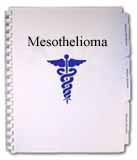|
Mesothelioma and Lung Cancer News - Return to Menu
Two designer drugs hit same lung cancer target, but only one is effective
Study demonstrates presence or absence of gene mutation a critical factor in treatment choice
BOSTON--Two designer cancer drugs differed dramatically in a laboratory test comparing their ability to shut down a mutant, overactive growth signal in lung cancer cells, reports a team headed by scientists at the Dana-Farber Cancer Institute.
Although both drugs killed cells containing a normal but overactive EGFR (epidermal growth factor receptor) molecule, only gefitinib (Iressa) killed lung cancer cells containing a mutated EGFR molecule. The monoclonal antibody drug cetuximab (Erbitux) had little effect on the mutant signal, evidently because it strikes at a different part of the EGFR molecule.
Reporting in the Aug. 17 issue of the Journal of the National Cancer Institute, the researchers say that the divergent results add to growing evidence that mutations in the targets of designer drugs critically influence their effectiveness. Erbitux is an effective inhibitor of EGFR signals in colorectal cancer, which involves a normal, not mutant, EGFR molecule.
"We now know of several groups of patients who benefit from therapy targeted at EGFR," says Pasi A. Janne, MD, PhD, of Dana-Farber, and a senior author of the paper. "Those with EGFR mutations will benefit from Iressa or Tarceva (erlotinib), while another group, without EGFR mutations, will benefit from Erbitux."
The lead author is Toru Mukohara, MD, and the senior authors are Bruce E. Johnson, MD, and J?ne, all of Dana-Farber.
Iressa and Erbitux both are designed to squelch the overexpressed, or overactive, EGFR signal that spurs growth in several types of cancer. In some forms of the disease, including lung cancer of the non-small-cell type, and colorectal cancer, the abnormal signals are generated by a normal EGFR molecule. In a small percentage of patients with non-small-cell lung cancer (NSCLC), the overactivity stems from a mutant EGFR protein: those patients tend to have a better outlook, and Iressa and Tarceva are particularly effective for them.
Mukohara and his colleagues wanted to determine whether Erbitux might be another option for NSCLC patients who carry the EGFR mutation. To test this idea, they treated lung cancer cell lines in the laboratory with Iressa and with Erbitux. They reported that both drugs blocked the excess signals in cells with normal EGFR, but only Iressa was significantly effective in those carrying a mutant EGFR.
"It tells us something about the difference in the drugs' ability to cause a regression of the cancer by shutting down the abnormally active growth signal receptor, EGFR," says Janne. "If you want to choose a way of inhibiting the mutant EGFR receptor, you would pull Iressa and Tarceva off the shelf, not Erbitux."
Iressa and Tarceva are known as small-molecule drugs that can be taken orally and block the part of the EGFR molecule that's located within the cell. In NSCLC, patients with the mutation often respond to both drugs, though only Tarceva has helped patients live slightly longer in clinical trials. Erbitux is a monoclonal antibody drug that binds to a portion of the EGFR receptor that extends outside the cell. This difference in action is the apparent explanation for why they performed differently against the mutant EGFR cells.
The scientists also looked at cases of four NSCLC patients with EGFR mutations who had been treated with the two drugs. The scientists' predictions were confirmed: all patients had some tumor shrinkage when they received Iressa, but none of the cancers responded to Erbitux.
Janne says that the experiment told the scientists something new about the biology of the EGFR mutation in NSCLC. "The lesson is, to inhibit the mutant receptor, you need to inhibit the domain of the EGFR molecule that lies within the cell, as opposed to the extracellular domain," J?ne says.
Contact: Bill Schaller
william_schaller@dfci.harvard.edu
617-632-5357
Dana-Farber Cancer Institute
###
The study was supported in part by the National Institutes of Health and the National Cancer Institute's Lung SPORE grant.
The study's other authors are Jeffrey A. Engelman, MD, and Joseph Pearlberg, MD, Dana-Farber; Nasser H. Hanna, MD, Indiana University School of Medicine, Indianapolis; Beow Y. Yeap, ScD, Massachusetts General Hospital; Neal Lindeman, MD, Brigham and Women's Hospital; Balazs Halmos, MD, University Hospitals of Cleveland; Zenta Tsuchihashi, PhD, Pharmaceutical Research Institute, Bristol Myers Squibb, Princeton, NJ; Lewis C. Cantley, PhD, Daniel G. Tenen, MD, and Susumu Kobayashi, MD, Beth Israel Deaconess Medical Center.
Dana-Farber Cancer Institute (www.dana-farber.org) is a principal teaching affiliate of the Harvard Medical School and is among the leading cancer research and care centers in the United States. It is a founding member of the Dana-Farber/Harvard Cancer Center (DF/HCC), designated a comprehensive cancer center by the National Cancer Institute.
|

































